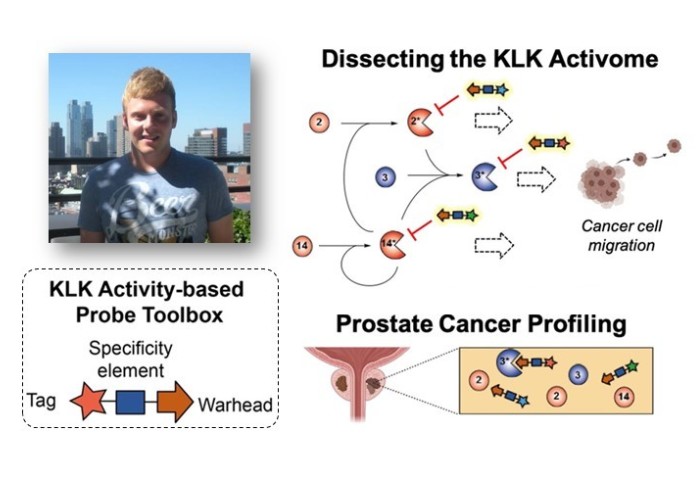Activity-based probes to dissect the KLK activome in prostate cancer

Congratulations to Dr Scott Lovell whose PhD work was recently published in the Journal of the American Chemical Society.
Prostate cancer is the most common cancer diagnosed in men and although there is an excellent 5-year survival rate thanks to current therapies some patients go on to develop advanced prostate cancer which can stop responding to treatment.
Kallikrein-related peptidases (KLKs) are a family of serine proteases and form a network referred to as the KLK activome. In prostate cancer (PCa), increased KLK activity promotes tumour growth and metastasis through multiple biochemical pathways. Scott’s work aimed to quantify and track changes in the KLK activome and therefore validate KLKs as potential drug targets for this common cancer.
The paper: Activity-based probes to dissect the KLK activome in prostate cancer details a technology platform that enables simultaneous orthogonal analysis of three important KLKs: 2, 3 and 14 and the dissection of the KLK activome in prostate cancer cells. An important disconnect was found between KLK activity and abundance, leading to the suggestion that KLK proteolysis should be monitored along with the standard PSA test routinely used for prostate cancer diagnosis and monitoring.
Scott and co-authors used selective inhibitors and multiplexed fluorescent activity-based protein profiling (ABPP) along with biotinylated ABPs to demonstrate that increased KLK14 activity leads to a migratory phenotype and that KLK-mediated signalling mechanisms could contribute to prostate cancer metastasis to bone. This work presents a powerful approach to probing dysregulation of the KLK activome as a promising therapeutic target in advanced prostate cancer.
Scott completed his PhD in the Tate group as part of the ICB-CDT and carried out this work in collaboration with Professor Judith Clements and Dr. Thomas Kryza at the Translational Research Institute in Brisbane, Dr Reiko Tanaka (Bioengineering) and Professor Charlotte Bevan (Surgery and Cancer) from Imperial and with contributions from Tate group members past and present: Leran Zhang, Anna Neodo, Elena De Vita, Elisabeth Engelsberger and Maria Maneiro.
This work was supported by the EPSRC through the ICB CDT and a Doctoral Prize fellowship, Cancer Research UK, Worldwide Cancer Research, the Swiss National Science Foundation and the CRUK Imperial Centre.
Article supporters
Article text (excluding photos or graphics) © Imperial College London.
Photos and graphics subject to third party copyright used with permission or © Imperial College London.
Reporter
Jennie Hutton
Department of Chemistry